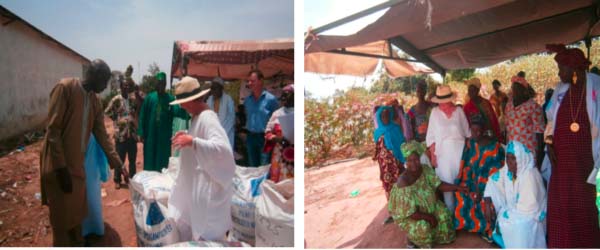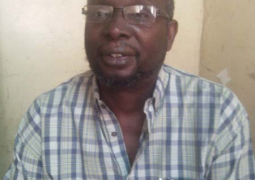
Hello and a warm welcome to yet another edition of your weekly Agriculture and Development column, that focuses on issues affecting farmers and other matters related to the development of agriculture.
In this week’s edition, we bring you the distribution of fertilizers and seeds to various farmers within the four regions by UN FAO.
The Food and Agriculture Organization, FAO, on Wednesday 18 June distributed fertilizer and seeds to four regions in the country under the EU MDG1c Project at a ceremony held in Niumi Buniadu in the North Bank Region.
The fertilizer and seeds was provided by European Union and implemented by FAO to be distributed to 3,725 farmers and members of the community-gardens to help boost production during this year’s farming season.
Speaking at the occasion, Perpetua Ketapa Kalala, the FAO representative in The Gambia, said the MDG1c project intensification of crop production and school feeding programme was a bilaterally funded project by the European Commission to the tune of 7.6 million euro to accelerate the attainment of the related Millennium Developmental Goal.
FAO was implementing component one of the project which deals with crop production intensification, while the World Food Programme (WFP) implements the second component dealing with school feeding programmes.
“The specific objectives of the EU supported project are to increase household food security and incomes of participating farmers and improve nutrition in school-aged children,” she said.
The main target of the component was the small-holder producers from 140 communities, with women and youths as the main focus, adding that the component was expected to benefit about 9, 000 farmers.
FAO’s role in the MDG1c project was in line with its mandate, which is to raise awareness levels of nutrition, improve agricultural productivity to better the lives of rural populations and contribute to the growth of the world economy.
To meet these objectives of component one, the project covers a range of activities that support production intensification, post harvest handling and commercialization for three major food crops in the Gambia - rice, millet and maize.
In recognition of the importance of soil fertility and a sustainable supply of improved seeds, the component would also improved farmers access to quality seeds and fertilizers.
FAO is handing over 350 metric tonnes of urea and nitrogen, phosphorus and potassium NPK fertilizers that would contribute to the project requirements of the rainy season production and 100 metric tonnes of certified rice seeds produced from project-supported community seed farms.
Agnes Guillaud EU Charge d’ Affaires at the EU office, said according to the Gambia national agriculture investment programme (GNAIP), agriculture has the potential to contribute significantly to the attainment of the MDGs in The Gambia, but the current level of productivity of the sector was well below the growth required to tackle food insecurity and poverty.
She said in 2013, the Gambia formally secured a 7.6 million euro grant (more than D400 million) to tackle the MDG1c food insecurity target.
It was agreed with the government of The Gambia that the programme would be implemented through separate agreements with two of its long-term partners, WFP and FAO.
WFP was implementing the school feeding programme and the FAO was working towards increasing national agricultural production (both in quantity and quality) with a view to improve farmers income, but also to make excess foodstuff available for school feeding, among others.
Sherrif Bojang, DPS Ministry of Agriculture, said the ministry of Agriculture recognized the close collaborative efforts of FAO to ensure food security in The Gambia.
He said, among other things, that the provision of the outlined agricultural inputs was an important step to the attainment of food security.
He said the ministry of Mgriculture was following with keen interest the implementation of the MDG1c project, and hope that its interventions can serve as a good model for the attainment of food security aspirations.
Lamin Queen Jammeh, Governor NBR, on behalf of the beneficiaries, said the inputs are important because food is very important in human life.
He said it is a very important policy for government, adding that commercialization in agriculture could only be possible if “we grow more food that will sustain us so that we can sell the rest.”
Governor Jammeh said to achieve the targets of MDG1c, there was a need for global partnership.
The North Bank Region was the leading producer of groundnuts in the country, he declared, and that helping them with more farming inputs would not be a waste.
He thanked the donors for the good gesture, and assured them that the fertilizer and seeds would be put to the right purpose.
The regions that benefitted are North Bank Region, Central River Region North and South, and Upper River Region.


